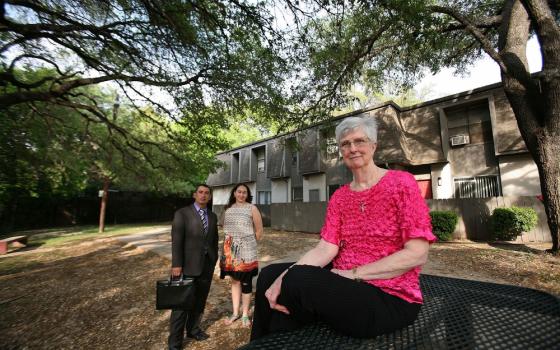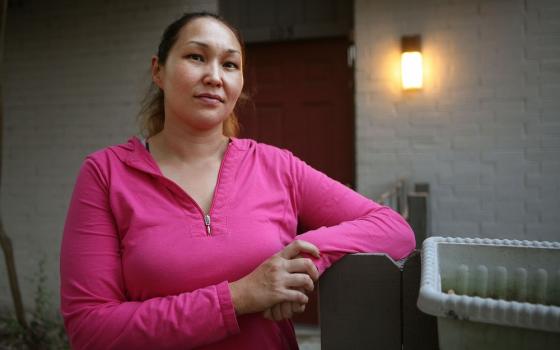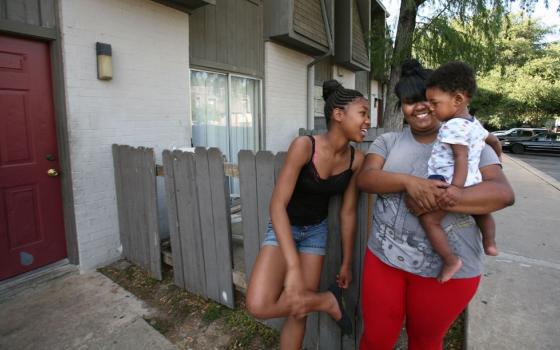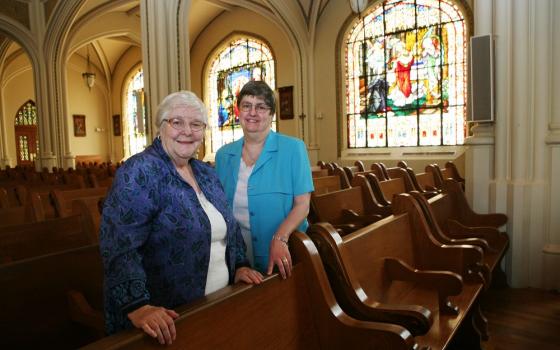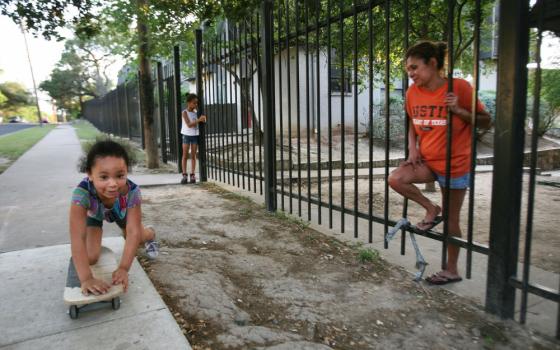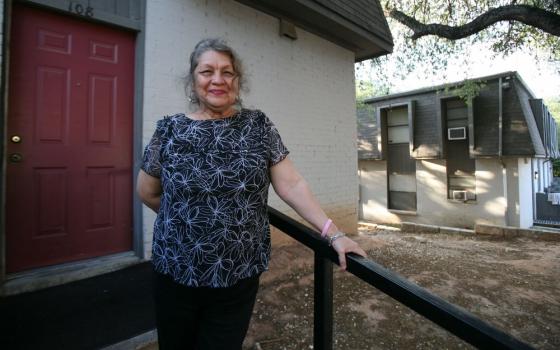Koreena Malone knew she couldn’t do it alone. The single mother of three didn’t know how she could lead the charge to save 173 affordable housing units at her apartment complex. But if she did nothing, she risked losing her family’s apartment on a quiet tree-lined street that was close to her children’s school.
“I begged people – I can’t do this right now,” Malone said. “I was studying for the CPA, I’m a mother. I was, like, someone else has to take this on. There has to be somebody else.”
There wasn’t.
But Austin Interfaith saw it differently. At a gathering with the apartment’s tenants and the neighborhood association, Jesse Posner had identified Malone as a leader.
Posner was a special project organizer of Austin Interfaith, a part of a regional community-building network known as the West/Southwest Industrial Areas Foundation. Posner was at the meeting to do what Sr. Christine Stephens, co-director of the foundation, had trained her to do: spot leaders who could find alternatives to tearing down the Oak Creek Village Apartments.
“You find people who . . . if put into relationship with one another and taught how to organize, can do just incredible things,” explained Stephens, a member of the Sisters of Divine Providence.
For over 30 years, Stephens and co-director Ernie Cortes have trained lead organizers for an eclectic mix of 40 dues-paying partner organizations that include labor unions, churches, mosques, synagogues and non-profits like Austin Interfaith. The mission of her organization, part of the national Industrial Areas Foundation founded nearly 75 years ago, is to identify and train people like Malone to solve problems for themselves.
“The whole purpose,” Stephens said, “ is not to impose on people what their issues are.”
Even though Stephens does not directly train local organizers like Malone, her impact has been felt across the community like ripples from a pebble tossed into a pond.
Under Stephens’ and Cortes’ tutelage, community leaders were able to get speed bumps for San Juan de los Lagos Church in San Antonio, living wage requirements in Austin, water and sewers for colonias along the Texas border and, years ago, improved drainage on San Antonio’s west and south side.
Staving the flood
“When it rained, people would die in the floods because San Antonio was built on a slant,” said Sr. Pearl Ceasar a member of the Sisters of Divine Providence and executive director of Project Quest, another organization affiliated with the IAF. “There were no drainage systems on the west and south sides, so the water would just rush into the homes.”
Leaders from Communities Organized for Public Service/Metro Alliance another partner organization researched the problem. “What they learned was that money was going to the north side, to new development. It wasn’t going to the west and south side,” Ceasar said.
According to a San Antonio Express News article, it was leaders from the alliance who pointed out that bond money voted in for drainage projects on the west and south side of town was being diverted.
“One of the first demands of C.O.P.S. was to indeed spend bond money where they [voters] had voted to spend it,” Stephens said.
But, Cortes pointed out, it was Stephens who later finessed the plan when she studied maps and noticed the drainage lines for projects on the west and south side of town were not connected to one another. “Into which body of water does this drainage project empty into?” Stephens asked. “And they [city planners] said, ‘it doesn’t. It goes and it just stays; it’s like a water collection.’” Eventually Cortes said she was able to get the city of San Antonio to come up with a drainage plan.
Stephens wants to do more than just train leaders; she wants to transform them.
“The first thing I learned from Christine is the personal development of a leader is primary,” said Sr. Gabriella Lohan, a member of the Sisters of the Holy Spirit who has been an organizer for over 25 years and chairs the board for Project Quest. “You teach people how to gain power and how to use power, especially in terms of the needs of their families, infrastructure, health care.”
One such person was Carmen Anaya, a Mexican immigrant who did not speak English and who, Stephens said, was key in getting water and sewers to the colonias along the Texas border.
“And she would be speaking in Spanish, Stephens said, “and they [politicians] didn’t understand her – would have translations, but they would dare not look away from her. She just commanded attention.”
After she died in 2006, a school was named for her and she was recognized by the U.S. Congress.
It was Anaya’s work with the organization Valley Interfaith that gave her that “standing in public life,” Ceasar said. “We don’t lift up just one leader . . . there have been hundreds of leaders that have been transformed in that way, thousands.”
What it takes to organize
Stephens sees the preservation of institutions as another crucial role of their local Industrial Areas Foundation. When the Oak Creek Apartments faced demolition, organizers estimated that Travis Heights Elementary School would lose 88 students, according to Jacob Cortes, son of Ernesto Cortes and lead organizer for Austin Interfaith. (He replaced Posner in that role after she went to Bosnia on a leave of absence.)
This threat was a key reason that his organization decided to train Malone. Leaders feared that displacing the low-income families at Oak Creek could close the school and jeopardize church memberships as well.
Stephens got her start organizing in 1978. “What do you see in me?” she asked an organizer who encouraged her. “And he said, ‘your anger.’ That was the first time anyone had ever told me that anger could be a positive.”
She learned how to use anger as a motivating force from her father after her mother was crippled with rheumatoid arthritis. “I saw my dad use mother’s anger to kind of bring her back to life because she basically just gave up, and my dad made her so angry that he literally forced her to live again.”
Angry, however, is not an adjective colleagues use to describe the 73-year-old nun with an even-toned voice. Instead they use words like “friend,” “mentor,” “a grace and a blessing” and “excellent leader.” And, Ernesto Cortes said, “She has an incredibly good sense of humor.”
Motivating and training people did not come easily to Stephens. At first “she could be boring,” Ernesto Cortes said.
“Now she’s an extraordinarily effective trainer, insightful, clear, precise – and people always come away feeling like she really challenged them.”
Ceasar said Stephens, as a mentor, taught her that at times difficult conversations were necessary to bring about change. “What she helped me to see was that I wasn’t doing myself any good by being a ‘nice southern lady,’ and I wasn’t doing them any good.”
This took particular courage because she and Stephens have been lifelong friends. The two sisters will celebrate their jubilee, 50 years of religious life, in June.
While Stephens is not afraid to be honest with those she trains and mentors, she emphasizes the importance of building relationships in order to bring about change.
“Talk to and never talk about,” Stephens said, quoting her father who taught her the mantra at age five. “You can’t build these organizations without learning to deal with one another and deal straight with one another.”
And even though relationships can get strained when working with those in power, Stephens believes “for us it’s always about relationships, even if the relationship is tense and polarized. What we never want is for people to break the relationship.”
Getting the job done
In the case of the Oak Creek Village Apartments, Malone used these tactics to convince the developer to preserve the affordable housing units.
“Koreena, you know, she’s is a well-educated, strong leader, very forceful, and at times she could be very demanding,” Jimmy Arnold said. He is president of Eureka Multifamily Group, the developer of the project. “But ultimately they [Malone and Austin Interfaith] were reasonable and we came to terms. They were, let’s say, aggressive, but good to work with.”
Austin Interfaith organizers found that Eureka could gain $18 million from federal tax incentives and another $2 million offered by city leaders if they increased the density of their development to include affordable units.
“They were well informed, well intentioned,” Arnold said. “The biggest thing I think in their support was the fact that they had researched.”
As part of the agreement, Eureka will put residents up in other apartments while the old ones are demolished and rebuilt.
Jacob Cortes saw the outcome as a David-and-Goliath tale.
“A group of leaders figured out an incredibly complex and sophisticated group of policies and relationships, took on a major developer and politically powerful neighborhood association and won,” he said. “And they’re going to get a better standard of living because they’re not only going to keep their housing, they’re going to have better units.”
The people who benefitted most from the trickle-down leadership of the Industrial Area Foundation’s organizing work on this project were the Oak Creek residents who wanted to stay in their homes.
“I was really upset at first to think that we were going to have to leave this place,” said Fannie Harrell, a 14-year resident, “but I see it as a new beginning.”
[Nuri Vallbona, is a freelance documentary photojournalist who has focused most of her career on social justice projects such as modern-day slavery, inner-city poverty and crime. She worked for the Miami Herald from 1993 to 2008, has won a number of awards and is currently a lecturer at the University of Texas.]
Editor's note - An earlier version of the story misidentified Jesse Posner as a lead organizer with Austin Interfaith.
